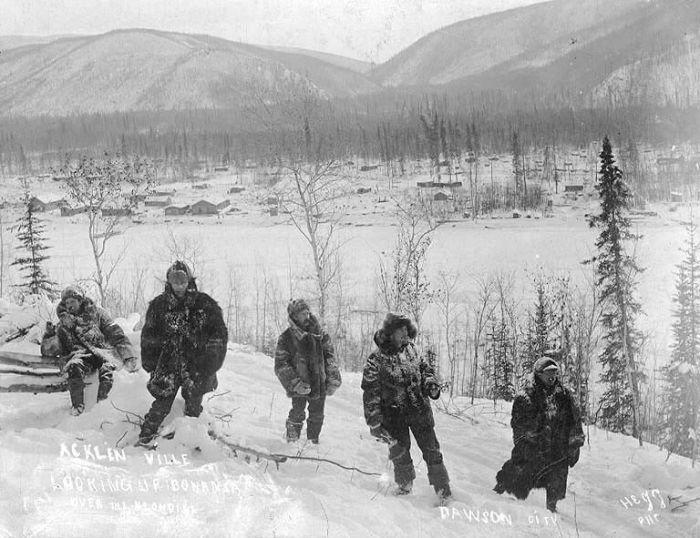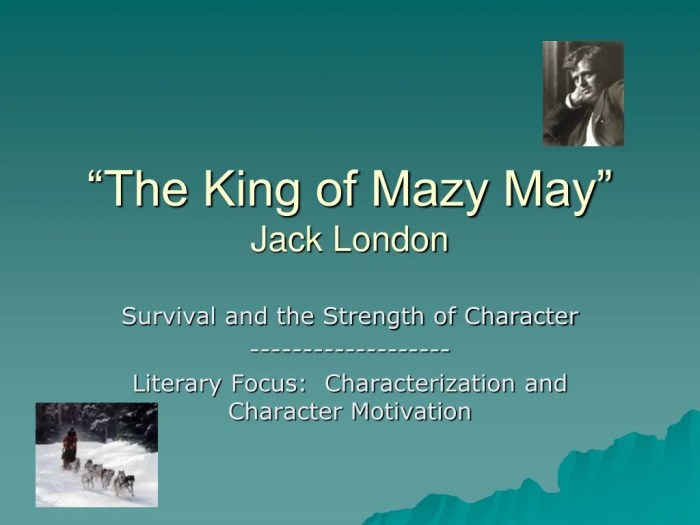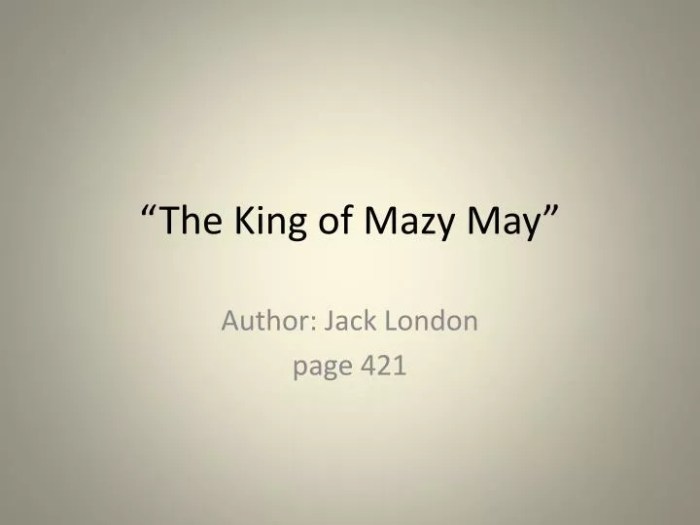Jack london the king of mazy may – Jack London, the renowned American author, left an indelible mark on the literary world with his captivating tales of adventure, survival, and social justice. As the “King of Mazzy May,” he crafted stories that continue to resonate with readers to this day, offering profound insights into the human condition and the complexities of the natural world.
London’s experiences in the Klondike Gold Rush and his deep-seated socialist beliefs shaped his writing, imbuing his works with a unique blend of realism and social commentary. Through vivid imagery and gripping narratives, he explored themes of survival, nature, and the struggle for a just society.
The Life and Career of Jack London
Jack London (1876-1916) was an American author, journalist, and social activist. He is best known for his adventure novels set in the Klondike Gold Rush and other rugged environments, as well as for his socialist writings.
London’s early life was marked by poverty and instability. He dropped out of school at the age of 14 and worked a variety of odd jobs before becoming a sailor. In 1897, he joined the Klondike Gold Rush, an experience that would have a profound impact on his writing.
The Klondike Gold Rush and Its Impact
London’s experiences in the Klondike Gold Rush provided him with a wealth of material for his writing. He witnessed firsthand the brutality of nature and the human condition. These experiences led him to develop a pessimistic view of the world, which is reflected in many of his works.
London’s Klondike stories are often characterized by their stark realism and their focus on the struggle for survival. He wrote about the harsh conditions of the gold fields, the dangers of the wilderness, and the psychological toll that the gold rush took on its participants.
Socialism and Activism
London’s experiences in the Klondike Gold Rush also led him to become a socialist. He saw firsthand the inequality and injustice that existed in the world, and he believed that socialism was the only way to create a more just and equitable society.
London’s socialist beliefs influenced his writing in a number of ways. He wrote several works of fiction that explored socialist themes, and he also became active in the socialist movement. He gave speeches, wrote articles, and organized protests on behalf of workers’ rights.
Thematic Analysis of Jack London’s Works

Jack London’s literary works are renowned for their exploration of profound themes that resonate with readers of all ages. Through his vivid prose and compelling narratives, London delves into the complexities of human existence, nature’s unforgiving power, and the struggle for social justice.
Survival and Nature
One of the most prevalent themes in London’s writing is the struggle for survival amidst the harsh realities of nature. His characters often face extreme conditions, both physical and psychological, as they navigate the untamed wilderness. In works like “The Call of the Wild” and “White Fang,” London portrays the brutal struggle for survival in the unforgiving Alaskan wilderness, where only the strongest and most adaptable can endure.
Darwinism and Philosophical Influences
London’s thematic development was significantly influenced by the scientific theories of Charles Darwin. The concept of natural selection and the survival of the fittest is evident in many of his works. His characters often embody the Darwinian principle of adaptation, demonstrating the ability to evolve and overcome adversity.
Additionally, London’s writings reflect the influence of other philosophical ideas, such as Nietzsche’s concept of the Übermensch and the belief in the power of the individual to shape their own destiny.
Social Justice
Another prominent theme in London’s writing is the struggle for social justice. He witnessed firsthand the harsh realities of poverty and inequality in the late 19th and early 20th centuries. In works like “The People of the Abyss” and “Martin Eden,” London exposes the plight of the working class and the injustices they face.
He advocates for social reform and the eradication of poverty, highlighting the importance of compassion and empathy in a society marred by social stratification.
Character Analysis of Jack London’s Protagonists

Jack London’s protagonists are complex and compelling figures who embody his themes of individualism, survival, and the struggle against adversity. They are often outsiders or outcasts who must overcome great challenges to achieve their goals.
London’s protagonists are often motivated by a desire for adventure, wealth, or recognition. They are often willing to take risks and push themselves to the limit. However, they also have their flaws, and they can be reckless, impulsive, and self-destructive.
Development of London’s Protagonists
London’s protagonists often undergo significant development over the course of their stories. They learn from their mistakes, grow in strength and resilience, and come to a deeper understanding of themselves and the world around them.
This development is often a result of the challenges that the protagonists face. They are forced to confront their own weaknesses and to make difficult choices. Through these experiences, they learn to become more self-reliant and to appreciate the value of human connection.
London’s Protagonists and His Worldview
London’s protagonists reflect his own worldview, which was shaped by his experiences as a working-class man and a socialist. London believed that individuals should be free to pursue their own goals, but he also recognized the importance of social justice and equality.
His protagonists often embody these values. They are strong and independent, but they also care about the well-being of others. They are willing to fight for what they believe in, but they are also compassionate and forgiving.
Literary Style and Techniques in Jack London’s Writing: Jack London The King Of Mazy May

Jack London’s writing is characterized by its vivid imagery, naturalism, and adventure narratives. His unique literary style creates a sense of immediacy and realism that immerses readers in the worlds he creates.
Vivid Imagery, Jack london the king of mazy may
London’s writing is rich in sensory details that appeal to the reader’s senses. He uses vivid imagery to create a cinematic experience, bringing the scenes and characters to life. For example, in “The Call of the Wild,” he describes the sled dogs as “white as snow, with black muzzles and long, curling tails.”
This vivid imagery helps the reader to visualize the dogs and to feel their presence in the story.
Naturalism
London’s writing is often classified as naturalism, a literary movement that emphasizes the influence of environment and heredity on human behavior. His characters are often driven by their instincts and desires, and they struggle against the harsh realities of life.
For example, in “Martin Eden,” the protagonist is a self-educated sailor who fights against the social barriers that prevent him from achieving his dreams.
Adventure Narratives
London’s writing is also known for its adventure narratives. His stories often take place in exotic and dangerous settings, and they follow the adventures of strong and determined characters. For example, in “White Fang,” the protagonist is a wolf-dog who must learn to survive in the wild.
These adventure narratives appeal to the reader’s sense of adventure and excitement.
Influences
London’s literary style was influenced by a variety of writers and literary movements. He was particularly influenced by the works of Charles Darwin and Friedrich Nietzsche, whose ideas about evolution and the survival of the fittest resonated with his own experiences in the Klondike Gold Rush.
London was also influenced by the Romantic movement, which emphasized the importance of nature and emotion.
The Legacy and Impact of Jack London’s Writing

Jack London’s literary legacy extends far beyond his time, leaving an indelible mark on American literature and beyond. His captivating tales of adventure, social justice, and the human spirit continue to resonate with readers worldwide.London’s vivid descriptions of the Alaskan wilderness, his exploration of class conflict, and his unwavering belief in the power of the individual have inspired generations of readers and writers.
His works have been translated into over 100 languages, reaching a global audience.
Contemporary Relevance
London’s themes of social inequality, environmental conservation, and the pursuit of personal fulfillment remain highly relevant in today’s society. His exploration of the struggles faced by marginalized communities and his advocacy for social justice continue to resonate with readers grappling with similar issues.
Additionally, his depiction of the beauty and fragility of the natural world highlights the importance of environmental stewardship in the face of modern challenges.
Clarifying Questions
What was the significance of the Klondike Gold Rush in Jack London’s life and writing?
The Klondike Gold Rush was a transformative experience for London, exposing him to the harsh realities of the natural world and the human struggle for survival. It provided him with firsthand knowledge of the hardships and dangers faced by prospectors, which he later vividly depicted in his works.
How did London’s socialist beliefs influence his writing?
London’s socialist beliefs led him to explore themes of social inequality and the plight of the working class in his writing. He believed that literature had the power to raise awareness about social injustices and inspire change. His works often depicted the struggles of individuals against oppressive systems.
What are some of the recurring themes in Jack London’s works?
Survival, nature, and social justice are central themes in London’s writing. He explored the human capacity for survival in the face of adversity, the beauty and unforgiving nature of the natural world, and the importance of fighting for a more just society.